
Exclusive Interview with Bobby Rahal
Atlas F1 Columnist
In 2001, Bobby Rahal landed in Formula One from across the ocean as a breath of fresh air, and no sooner was he gone. He didn't fit into the political world of the F1 paddock and he found himself a victim of circumstances that weren't always of his own doing. In an exclusive interview with Mark Glendenning, over a year after Rahal left Jaguar Racing to return to CART, the amicable American now reflects on his career as a racing driver and team owner, on the differences between F1 and American racing, and explains why he isn't likely to return to Formula One
At some point nearly two years ago, Ford signed American Bobby Rahal to run their year-old Jaguar Racing team and gave the successful CART team owner free reign to build the team into a World Championship contender. But only a few months after he was first seen in the F1 paddock, Rahal was called into the Ford offices, where he agreed to pack up his belongings and cross the Atlantic back to the US, along with a handy severence pay and a dealership agreement that would see him financially settled.
The immediate reason was a suggestion Rahal made to fellow team owner, Eddie Jordan, to buy out Eddie Irvine's contract for 2002. But the events which lead to Rahal's parting with Jaguar Racing must surely have begun a month or two before, when Rahal almost pulled out the coup to end all coups.
On Friday morning, June 1st 2001, Jaguar proudly announced the signing of technical guru Adrian Newey. The announcement sent ripples through the F1 paddock, and for a whole 12 hours Bobby Rahal was already seen the most successful team boss in recent Formula One history. But the illusion was shattered later the same day, when another press release appeared, this time on a McLaren letterhead, full of quotes from Newey explaining that the whole thing had been a terrible mistake and that the future, for him, was most definitely silver.
It left Jaguar Racing, Newey himself, and his long time friend Rahal, all looking like fools. But almost 18 months later, Rahal refuses to speculate how things could have been had the outcome of that dramatic Friday been different.
"Given the outcome," Rahal says today, "I think Adrian made the right choice. But would I have been around if Adrian moved to Jaguar? That is a question that can never be answered, because I don't believe anyone really knows. Certainly, had Adrian joined me at Jaguar it might have made it harder to remove me. But then again, who knows!"
Rahal says Newey and himself remained friends, and after more than a year away from Formula One, he sounds remarkably at peace with himself, despite the fact that he would have liked his time in Grand Prix racing to have ended much differently.
"Certainly, I think Pedro disappointed as I had faith in him, but having said that, the environment was not conducive to him especially after I left," he comments. "I think both Webber and Pizzonia will do a very good job for Jaguar. They have the right temperament and attitude to help take the team forward. While I don't know Pizzonia, Mark appears to be a 'team player' and for Jaguar to reach its objective, it needs 'team players' - those who will put the good of the team first before their own interests."
When he was young, Rahal was passionate about Formula One to a degree uncommon amongst Americans of his generation, and he always looked toward European racing as his main ambition, rather than becoming an oval-track king.
"Going to Europe to race was to me, a dream come true," he relates. "My hero growing up was Jimmy Clark, it wasn't AJ Foyt."
He finally did make it to Formula One, albeit briefly. Walter Wolf Racing signed him on in 1978, and he drove a Wolf-Ford in two races - the US GP at Watkins Glen, and the Canadian GP at Montreal.
Rahal had already crossed paths with some of the F1 stars during a highly successful spell in Formula Atlantic, where he could boast Keke Rosberg and Gilles Villeneuve among his scalps. But his F1 debut was a relatively quiet affair. At Watkins Glen, He qualified 20th out of 26, and kept out of trouble to come home 12th. In Canada a couple of weeks later, things started extremely well.
"Well, I had one of the ground-effect cars, a Wolf WR5, and in the morning practice session I was, like, fourth quickest," he recalls. "If the team manager had any brains he would have called me in, because I was 25, trying to make a name for myself, and I stayed out and tried too hard and I went off and crashed the car. It was not repairable, so they dragged one of the first Wolf cars that they had - it was about a year old, a little over a year - and they dragged it out of the hotel lobby and prepared it and it was actually quite a good car!
Given that Rahal's spell as a Grand Prix driver was such a short one, it's tempting to wonder whether he considered F1 to be unfinished business when he returned in British Racing Green.
"Well, I always thought it was going to be a good opportunity for me to... you know, I'd kinda done it all in the States, and why not give it a go?" he responds. "And unfortunately, several months after I was there, the guy who really brought me there had retired from Ford, so my champion had left and it just became a political issue.
"It's unfortunate, but it was the right decision at the time. And then things changed, but in the end I have no regrets. I'd like to have stayed there and I think we were making some progress, but there was such desperation in so many ways that I think politics got the better of it."
MG: So the biggest difference between F1 and CART from a team boss's perspective is the politics?
Rahal: "I think so. I mean, racing is racing, and in the end, when the green flag drops or the lights go out, in the end it's racing. Formula One could have just as good racing if not better on one half the budget if they allowed it. But the rules in Formula One are not configured to create parity amongst the teams, which CART is, and IRL, and NASCAR.
"The view in the United States is that the better the competition, the more the entertainment value for the people, the more they'll go to the races, the more they'll follow races. Formula One's not built that way, it's very much 'I've got mine, you're going to have to go and get yours'. And it's been that way for quite a while. So it's just a very different outlook on what racing should be, and what it should represent to those people who love it and want to go see it."
MG: Would you go back to Formula One if the right opportunity came up?
Rahal: "I think probably at this stage, no... Unless Frank Williams wants to let me run his team or whatever, and I doubt he would because he and Patrick Head do a pretty good job at it! It would be interesting to do it if you were really given the commitment to have the time to create something, but it's so difficult. Only because really the rules perpetuate the rich getting richer and the poor getting poorer.
"So I don't think I would, and it would have to be an awfully interesting program to convince me otherwise."
Formula One may have been a less than happy hunting ground for Rahal, but in America he won just about everything there was to win. A 17-year career as an Indycar driver was rewarded with 24 wins and 19 poles from 264 starts, and three championships - 1986, 1987, and 1992. For good measure, he complemented his first championship by winning the Indy 500 the same year. I had always wanted to know how it felt to be leading the final lap of the Indy 500, and with Rahal sitting across from me, this was my chance. Were you starting to imagine that the car was making some weird noises? I finally asked.
Rahal laughs. "Oh yeah! Oh yeah, definitely, you're just praying that the thing'll keep going. I don't even remember the last lap of the Indy 500. Especially when going down to get the chequered flag, I think the thing I felt most was relief that we'd finally done it. You just have so many emotions flood over you that you're not quite sure what the hell to think."
MG: But did the Indy win stand out as the most special achievement of your racing career?
Rahal: "I don't think there's any one achievement. I think just the fact that I had the kind of career that I had. When you start racing, all you dream and hope and pray … I mean, you may not quite expect it but yeah, you start racing because you love driving racing cars. And you start to win, and the potential is there of being a champion spring up.
"When I started, I had absolutely no expectation. I mean, I just wanted to drive a race car. And of course, as time went on and you start winning races, your expectations change. But in the end, I have no complaints whatsoever. I achieved far more than I ever thought I would, I had a great time doing it and met a lot of nice people. I'm a very lucky man. So for me to regret anything wouldn't be right."
MG: Was it hard to juggle the responsibilities of being an owner and a driver at the same time?
Nowadays, Rahal has returned to his role as the full-time head honcho of the CART team that bears his name. CART is a series that is currently facing a similar kind of soul-searching that Jaguar is doing across the Atlantic. The reasons for CART's woes are rather different, and every minute that it takes to sort things out sees the series sink just a little deeper into the mire. Manufacturers are jumping ship to the rival IRL series, and several of the front-running teams that have not already followed suit will do so at the end of this season.
"Well it's kind of in flux a little bit unfortunately," Rahal says. "I mean, the racing's very good. You know, it's been great racing. Unfortunately, the manufacturers, I think when they left, that had probably a bigger effect than one might think. But it's very good racing, and there's good teams there. This coming year, 2003, is I think a very critical year for CART, and if we get through that year in good shape, it's nothing but roses."
MG: If things kept going downhill, would you consider a jump to the IRL?
Rahal: "Well, we're doing the Indy 500, which we did last year. We're going to do Indy again this year, and probably do a few of the races prior to that. You know, while I don't necessarily agree with everything they do, I think the IRL has some very good things about it. And our sponsors want to be at Indianapolis, and that's kind of the trump card that they have.
"We have to do what our sponsors want us to do. We're here for them, not them for us, so it makes it sometimes difficult for me, especially as I've been so outspoken about it over the years. But I still think there's awfully good racing there and I think of course going to the Indy 500 is a big deal. Always has been and always will. Obviously my first wish would be for both series to somehow come together in some way, shape or form, but I don't feel confident that it will happen. So we'll see."
Rahal also made the news earlier this year when he announced a deal to run Danica Patrick in the CART feeder series Toyota Atlantic. The issue of women in top-level racing has floated around for years, and while several females have popped up in categories such as F1 and Indy Cars, few have made much of an impression. Some were in the wrong car at the wrong time, others never had the right doors open, and some simply weren't good enough.
Patrick, who graduated from the ultra-competitive British Formula Ford series, could well be a different story.
MG: So can you offer Patrick much in a mentor's capacity?
Rahal: "Oh yeah, definitely. She's going to run Toyota Atlantic for us this next year, and I'm hopeful that she has a good year. I think she's a pretty talented young lady - she's young, she's only 20 - so time is on her side to some degree, and I truly believe at least in America, she's got more talent than any American woman has ever had. So I think she has a good future ahead of her if everything works out."
MG: At the end of the day, what's the biggest obstacle that young drivers like Danica have to overcome in trying to get to the top level?
Rahal smiles. "Money!" he exclaims. "If you talk to drivers in Australia, or in Europe, or in America - they'll all be looking for money."
And even in Formula One, who could argue with that.
The news that Jaguar Racing has dumped Eddie Irvine and Pedro de la Rosa in favour of what looks to be a considerably more dynamic pairing of Mark Webber and Antonio Pizzonia has certainly created some waves. British media in particular have gone into overdrive, and given that one of the implications of the deal is that their greatest column-filler, one Edmund Irvine, could well be spending rather more time on his boat next year than he would like to, this is not really a surprise.
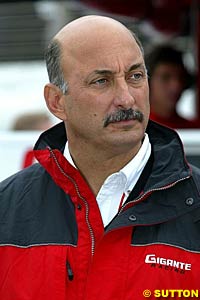 But the story stands out for another reason: by and large, it has been welcomed as a positive step, and those kinds of stories have been rather thin on the ground where the boys in green are concerned. In fact, the last couple of years had seen the team in constant turmoil, with many personnel changes and turbulent technical fouls highlighting the hardship of running a Formula One team, even if you're owned by one of the world's largest automaker.
But the story stands out for another reason: by and large, it has been welcomed as a positive step, and those kinds of stories have been rather thin on the ground where the boys in green are concerned. In fact, the last couple of years had seen the team in constant turmoil, with many personnel changes and turbulent technical fouls highlighting the hardship of running a Formula One team, even if you're owned by one of the world's largest automaker.
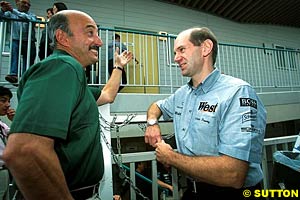 He doesn't stay in touch with the team, stating that "I hear from people from time to time - especially after they have just left. But all in all, I don't speak very often with them as many have moved on." But he does keep an eye on the Formula One news. And, when asked to comment on the all-new 2003 line up of his former team, he sounds remarkably in the know.
He doesn't stay in touch with the team, stating that "I hear from people from time to time - especially after they have just left. But all in all, I don't speak very often with them as many have moved on." But he does keep an eye on the Formula One news. And, when asked to comment on the all-new 2003 line up of his former team, he sounds remarkably in the know.
Unfinished Business
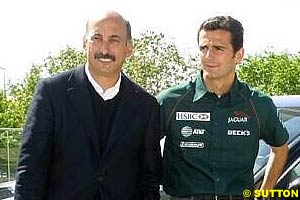 "I qualified it not particularly that well, like maybe, second last row I think. But the race started, and I passed Rosberg and Piquet and Tambay and a bunch of other guys, and then about a third of the way through the race the fuel system packed up. It was the right car for that track, I mean it was a much nicer car to drive than the other one. Who knows, if it had finished... I think it broke after about 30 laps, and we were in about eighth place at the time so, you know... it could have been good."
"I qualified it not particularly that well, like maybe, second last row I think. But the race started, and I passed Rosberg and Piquet and Tambay and a bunch of other guys, and then about a third of the way through the race the fuel system packed up. It was the right car for that track, I mean it was a much nicer car to drive than the other one. Who knows, if it had finished... I think it broke after about 30 laps, and we were in about eighth place at the time so, you know... it could have been good."
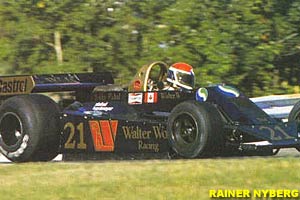 "It's not like CART, it's not like other forms of racing, and so any new team coming in, there had to either be an unbelievable amount of money involved, or there has to be real patience. I don't think anybody can spend more money than what Ferrari was spending, and so therefore you have to have backers that are more patient than anybody else. I think that's unrealistic to expect, because when people put up a lot of money they want results now.
"It's not like CART, it's not like other forms of racing, and so any new team coming in, there had to either be an unbelievable amount of money involved, or there has to be real patience. I don't think anybody can spend more money than what Ferrari was spending, and so therefore you have to have backers that are more patient than anybody else. I think that's unrealistic to expect, because when people put up a lot of money they want results now.
Money Makes the Racing World Go 'Round
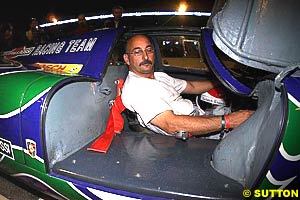 Rahal: "Well, I always had people running the team. On race weekends I was the driver, and I think as the driver you're always involved in the affairs of the team anyway, or you should be, because they affect you one way or the other. So I never found that the workload or my focus was hurting in any way by being an owner, because I'd always been very intimately in the runnings of the team, or been very involved in where the team was going as it was. So it was kind of a very easy segue for me."
Rahal: "Well, I always had people running the team. On race weekends I was the driver, and I think as the driver you're always involved in the affairs of the team anyway, or you should be, because they affect you one way or the other. So I never found that the workload or my focus was hurting in any way by being an owner, because I'd always been very intimately in the runnings of the team, or been very involved in where the team was going as it was. So it was kind of a very easy segue for me."
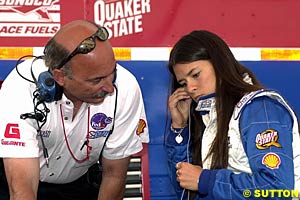 "It's tough for an American to go to England to race," Rahal says. "Just because it's not a very hospitable environment for anybody, particularly Americans, and being a woman makes it even doubly so. And all that has made her just a tough character. I mean, she's tough. It takes tremendous fortitude and dedication and sacrifice to do that, and I have great admiration for that."
"It's tough for an American to go to England to race," Rahal says. "Just because it's not a very hospitable environment for anybody, particularly Americans, and being a woman makes it even doubly so. And all that has made her just a tough character. I mean, she's tough. It takes tremendous fortitude and dedication and sacrifice to do that, and I have great admiration for that."
Please Contact Us for permission to republish this or any other material from Atlas F1.
|
Volume 8, Issue 47
Atlas F1 Exclusive
Interview with Bobby Rahal
Articles
The Arrows Saga Continues
Technical Focus
Columns
Rear View Mirror
Elsewhere in Racing
The Grapevine
> Homepage |